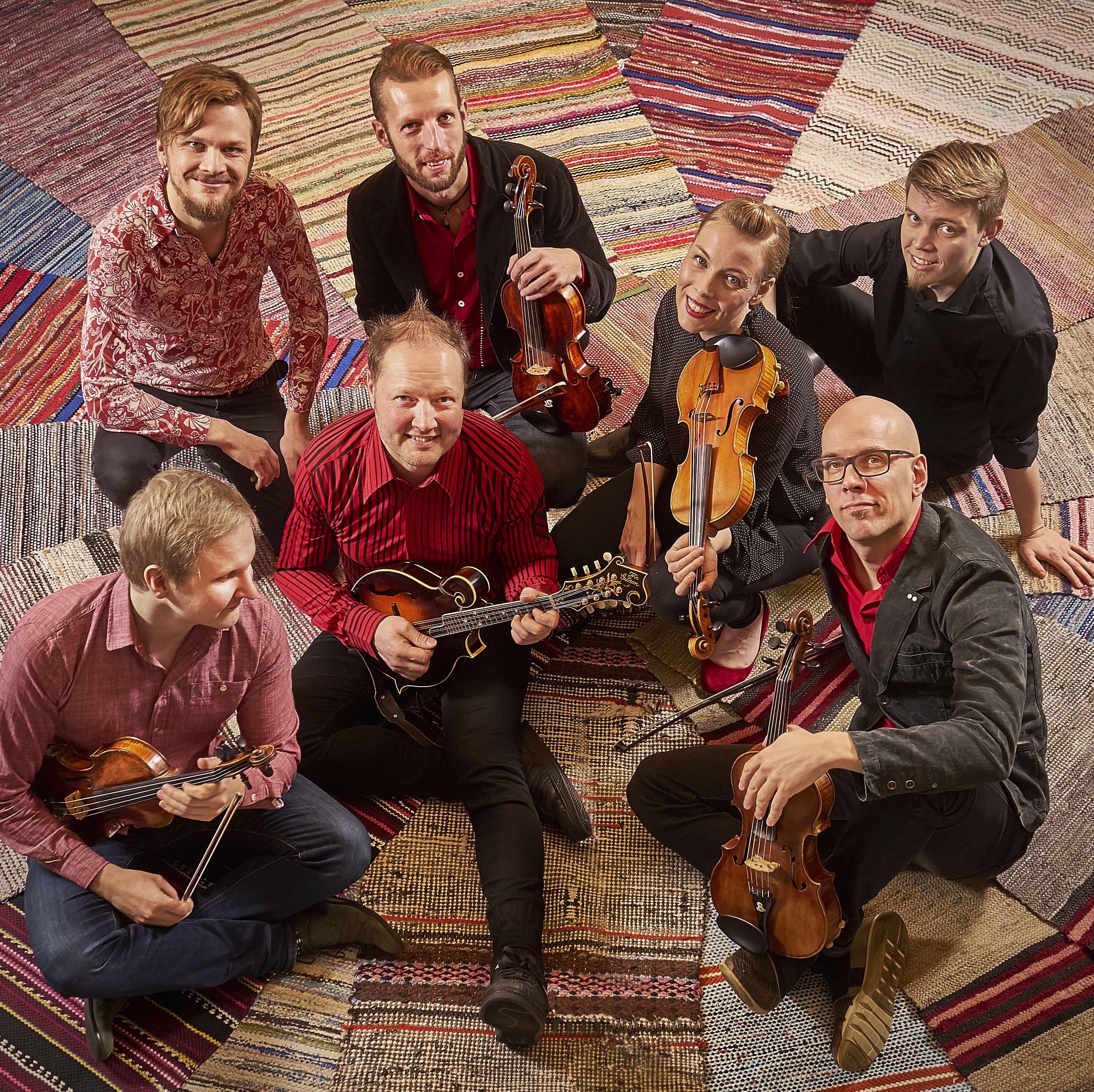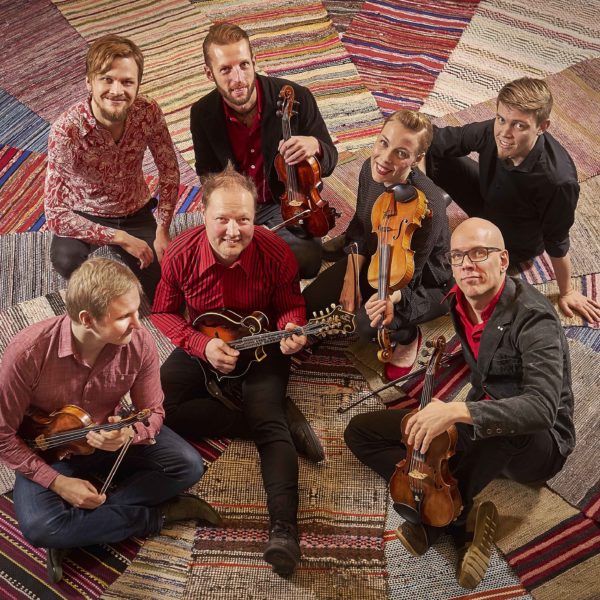
17 Jun Telluride Bluegrass: Hot Tunes From Frosty North – Frigg on Friday
The 45th Annual Telluride Bluegrass Festival takes place June 21-June 24. The event is completely sold out. But tune in to the live Festival stream at www.koto.org. And learn more about other Planet Bluegrass festivals at www.bluegrass.com.
Please scroll down to read an interview with Frigg.

Frigg
In Norse mythology Frigg wears many hats: wife of Odin, the All-Father and goddess of the sky, love, marriage, and destiny, a seer, who knew the future – but could never change it.
Which makes no never mind to Frigg, the Norse band, because its future seems very secure.
After nearly two decades of performing, the septet – an ensemble of fiddles, mandolins, acoustic bass and guitars – has amassed quite the CV, conquering the world with a sound dubbed “nordgrass,” a fusion of Western folk styles and Nordic folk sounds.
Though they hail from remote, tiny country of Finland, Frigg has brought its fast and furious fiddles to gigs in North America, Australia, Japan, Europe and the UK, including appearances on major festivals such as Celtic Connections, Glatt und Verkehrt, WOMADelaide and Rainforest World Music Festival, to name just a few.
And now Telluride Bluegrass is treated to this blizzard of jigs, reels and bluegrass inventions: Frigg performs for the very first time at the Festival on Friday, June 22, 11:15 a.m. – 12:15 p.m.
“The new group I’m personally most excited to hear and meet is… Frigg,” says Brian Eyster , marketing guru, Planet Bluegrass, ‘”The seven-piece instrumental band from Finland, is led by four fiddlers on the frontline. My Spotify stats reflect that I’ve listened to their music more than anyone else’s in 2018. Though they’ve been together for 15+ years (and a beloved name in nordic folk circles), Telluride Bluegrass will be their biggest US festival to date. Frigg’s music will not feel wholly unfamiliar to the bluegrass audience, yet there is a fresh energy and uniquely Nordic melodic and rhythmic sensibility. And drama. Some songs thrash harder than any bluegrass band; some are so gorgeous as to bring me to tears. I’ll be in the front row for this set.”
“The band flies, in a mix of traditional and their own tunes, all shapely, ingenious and delivered with acute mastery and massive swing and energy.,” wrote fRoots magazine, in its review of Frigg’s debut release in 2002.
Since then, Frigg has released seven albums.
The last studio album, Polka V from 2012, was chosen the folk music record of the year and a Teosto Prize nominee in Finland.
Among the most notable world music publications, Songlines singled out two of the group’s albums for its “Top of the World” chart, and on top of that fRoots, SingOut! and Rhythms have heaped praise on Frigg with all-caps superlatives.

In 2017, Frigg’s released album #8, Frost on Fiddles, a fresh, sophisticated blend of Nordic tradition and Americana that has attracted the ears of folk, World and classical fans alike.
“It doesn’t seem that long ago that the Finnish band Frigg, fresh from releasing their self-titled debut album, made an impression at the Nordic Roots Festival in Minneapolis for both their good playing and their youthful appearance. But that first album is now sixteen years old, and 2017 marked the release of their eighth album, called Frost on Fiddles. Original members Alina and Esko Järvelä (fiddles), Tuomas Logrén (guitar), and Petri Prauda (cittern and mandolin) are joined by fiddlers Tommi Asplund and Tero Hyväluoma and new bassist Juho Kivivouri on the effort. Frigg continues to bring outside folk and rock influences and a playful sense of adventure into a sound that remains anchored in the fiddling traditions of the village of Kaustinen. They may now be seasoned veterans instead of newcomers, but Frigg can still make a fresh, fun recording…,” wrote The Green Man review.
“…Now, the eight album by Frigg, Frost on Fiddles, has seen the light of the day. The originally Finnish-Norwegian group has now become wholly Finnish, but Nordic influences remain strong. The delicate and beautiful Scandinavian tone language has been dipped in BBQ sauce and it is being served fresh with pálinka, to be enjoyed in good company. Frigg is proudly its own entity, now more so than ever..,” said propermusic.com.
A Finnish supergroup…- a very exciting sound and lots of momentum. A lot of energy , driving rhythms and key changes ; the tunes are a non-stop whirlwind’ Phil Brown, The Drift, BBC Radio Lancs
“Doesn’t get much hotter than that, does it? Fantastic, fantastic band,” raved the BBC of the group and Frost on Fiddles.
As Festivarians are about to discover.
EMAIL INTERVIEW WITH PETRI PRAUDA OF FRIGG:

Frigg
TIO: Petri, how did your septet come to be named Frigg? Is the band named after the Norse goddess and if so, why her? What in the world does the wife of Odin have to go with “Nordgrass”?
Haha, the band is indeed named after the goddess. Originally, back in the day, we just saw the name in a dictionary and it looked cool. But in the end she does represent wisdom and love – a kind of Mother Earth figure. For us the name Frigg contains a good message to carry with you when you’re touring around the world.
“Nordgrass” is a term invented not by us but by the Finnish journalist Mika Kauhanen. It’s a fusion of words, much like Frigg’s music is a fusion of many styles and influences. The term has stuck with us ever since, so I’m guessing it works!
TIO: When did Frigg come together as a group and how did that happen?
The roots of the group go way back to a collaboration between two musical families: the Järvelä’s from Kaustinen, Finland, and the Larsen’s from Verdal, Norway. Frigg founding members Alina, Esko (sister and brother) and Antti (cousin) Järvelä met brothers Einar Olav and Gjermund Larsen via folk music courses (which their parents were organizing) already when they were kids. They decided that when they grow up they will start a real band together. And they did: in 2000 Antti invited Tuomas Logrén and myself to join in and so the recordings of Frigg’s first album saw daylight.
TIO: Who is Frigg today? Please talk about each member of the group. And has the septet remained constant since the group started performing?
The line up is all Finns today. Three founding members are still there: Alina and Esko on fiddles and myself playing the mandolin and cittern. Former regular fiddle stand-ins Tommi Asplund and Tero Hyväluoma became official members already more than a decade ago since Gjermund and Einar Olav became gradually very busy with their own careers.
Juho Kivivuori stepped in to play the double bass two years ago after Antti Järvelä had trouble with his hands and had to stop playing the instrument (he still plays the fiddle, mandolin and guitar with other groups). Tuomas Logrén decided to quit most of his touring after Frost On Fiddles (our latest album) recordings last year so we asked Anssi Salminen to join in on the guitar.
TIO: Please talk about the Finnish-Nordic musical origins of Frigg. How deep into those cultures do Frigg’s roots go? Were Americana and bluegrass influences there from the get-go? Please sum up Frigg’s sound. And does the handle “nordgrass” resonate with you?
Frigg’s music could be described in many ways, depending on the describer’s own musical background. I often say it’s “high energy acoustic Nordic fusion folk music” with four fiery fiddles on the front and a feisty rhythm section comprised of mandolin/cittern, guitar and double bass. We mostly perform our own compositions with influences from many different kinds of musical styles. But the roots are deeply in Finnish and Nordic fiddle traditions. At the heart of it all is the Kaustinen fiddle style with which Alina, Esko, Tero and Anssi have grown up with. This fiddle playing style is actually proposed nationally to be listed in UNESCO Representative List of the Intangible Cultural Heritage of Humanity to be protected – as one of two first things from Finland on the list!
The sound of Frigg has pretty much been there from the start. We have noticed that our concert set lists often include tunes from all our albums. At the same time I’d LIKE to believe some kind of progress has still taken place… Maybe it’s in the delicate new ways of organizing the four fiddles and creating overall more multi-layered arrangements – and making more space for mandolin, guitar and double bass to stand out, too!
What comes to “nordgrass” and Americana, I suppose is much to do with how we’ve combined Nordic fiddle melody playing with a bluegrassy rhythm section. And some of the breakneck tempos…
All kinds of musical influences seep in quite naturally for us. When we hear something we like – for example American, Irish, Scandinavian or Balkan folk music, rock’n roll or classical music – we want to employ the thing that caught the ear and make it into Frigg music. When someone suggests a new tune for the band we hear pretty quickly if it fits Frigg or not.
TIO: What are you looking forward to most about returning to North America and playing the Telluride Bluegrass Festival? Prior to this booking, had you heard of Telluride Bluegrass? If yes, what was the buzz?
Let me put it this way: Frigg was having rehearsals in Helsinki in the spring. We talked about the coming summer, the busy schedules and the tours. Esko concluded the talks and everyone’s feelings somehow along the lines of: “I don’t want to take ANY more gigs for this summer. Unless it’s, like, Telluride!”
And then we got the email from our agent asking for this booking. “OF COURSE WE GO!”
Telluride is the world’s No.1 bluegrass festival. We’re honored to join such a mind-boggling lineup of absolute top class artists.
TIO: What should Telluride Bluegrass Festivarians expect from Frigg’s set on Friday morning?
I’ll quote here: “Living dangerously, taking harmonic liberties, infecting the listener with the Finnish equivalent of a tarantula bite and making them weep with a deep Nordic melancholy. Outstanding music making” (Fiona Talkington, Songlines magazine 5-stars)
…We’ll do our best! Welcome!


Sorry, the comment form is closed at this time.